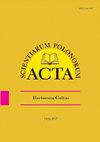辣椒对黄瓜花叶病毒抗性基因型的评价
IF 0.7
4区 农林科学
Q4 HORTICULTURE
引用次数: 0
摘要
黄瓜花叶病毒(CMV)是影响世界各地辣椒的最具破坏性的病毒之一。使用抗性品种是控制病毒的最有效方法之一。新的抗性来源的鉴定对抗性品种的开发至关重要。在本研究中,在2020年的受控条件下,通过机械接种测定了50种辣椒基因型(25种辣椒、15种辣椒和10种油菜籽)对CMV Sa分离株的反应。使用0–4疾病评级量表分析基因型,并根据疾病发生率和疾病严重程度得分将基因型分为抗性、中度抗性和易感型。研究结果显示,不同基因型的疾病发生率和严重程度存在显著差异(p<0.01)。该研究表明,在25种测试的C.baccatum基因型(KTB-11)中,有一种被发现具有抗性,三种基因型(KTB-29、KTB-34、KTB-57和KTB-72)被评为对CMV具有中度抗性。然而,已经确定所有测试的C.frutescens和C.annuum基因型都对CMV敏感。鉴定为抗性和中度抗性的基因型可作为辣椒育种研究的抗性来源。本文章由计算机程序翻译,如有差异,请以英文原文为准。
Evaluation of capsicum genotypes for resistance to cucumber mosaic virus
Cucumber mosaic virus (CMV) is one of the most destructive viruses that affect pepper all over the world. Using resistant varieties is one of the most effective ways to control the virus. Identification of new resistance sources is essential for the development of resistant cultivars. In the present study, the reactions of 50 Capsicum genotypes (25 Capsicum baccatum, 15 C. annuum and 10 C. frutescens) were determined against CMV-Sa isolate with mechanical inoculation under controlled conditions in 2020. A 0–4 disease rating scale was used to analyze the genotypes, and the genotypes were categorized as resistant, moderately resistant and susceptible based on disease incidence and disease severity scores. The findings revealed that there were significant (p < 0.01) differences in disease incidence and severity among genotypes. The study demonstrated that one of the 25 tested C. baccatum genotypes (KTB-11) found to be resistant, and three genotypes (KTB-29, KTB-34, KTB-57 and KTB-72) were rated as moderately resistant to CMV. However, it was determined that all tested C. frutescens and C. annuum genotypes were susceptible to CMV. The genotypes identified as resistant and moderately resistant can be used as a source of resistance in pepper breeding studies.
求助全文
通过发布文献求助,成功后即可免费获取论文全文。
去求助
来源期刊
CiteScore
1.30
自引率
14.30%
发文量
61
审稿时长
4-8 weeks
期刊介绍:
In Acta Scientiarum Polonorum Hortorum Cultus we publish original research papers and review articles containing new and significant information on broad aspects of horticulture and related disciplines. The papers are published in English only, in six issues yearly.

 求助内容:
求助内容: 应助结果提醒方式:
应助结果提醒方式:


